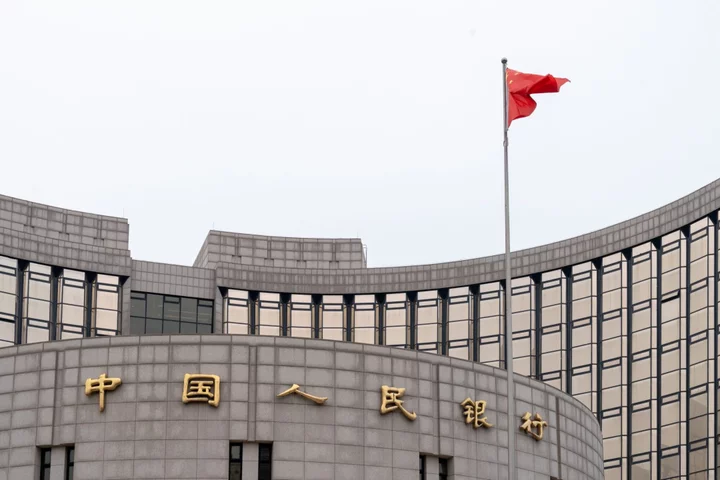China intensified efforts to stimulate the economy and support its currency, as investor concerns over the growth outlook persist.
The central bank will trim the amount of foreign currency deposits banks are required to hold as reserves for the first time this year, the People’s Bank of China said Friday. The move came hours after authorities announced fresh stimulus for the beleaguered property sector and unveiled plans to expand tax breaks for child and parental care and education.
The steps are the latest efforts to shore up confidence in the world’s second-largest economy, which is sagging under the weight of the persistent housing crisis, waning global demand and rising unemployment. Authorities have so far resorted to a drip-feed of targeted measures, avoiding the big-bang stimulus approach they deployed during the 2008 global financial crisis amid concerns over elevated debt levels.
“The policy package exceeds market expectations,” said Zhaopeng Xing, senior China strategist at Australia & New Zealand Banking Group Ltd. “Confidence will be boosted in the near term. We still need more evidence to confirm if it marks a turnaround.”
Financial institutions will need to carry just 4% of their foreign exchange deposits in reserve starting Sept. 15, the PBOC said, compared to the current level of 6%. The move effectively boosts the amount of foreign currency available in the local market, making it relatively more appealing for traders to buy the yuan.
The offshore yuan rose 0.3% to around 7.255 per dollar after the news. A gauge tracking Chinese property developers gained as much as 2%, while the broader CSI 300 Index climbed 0.8%. Hong Kong’s stock market was closed due to a typhoon.
China’s currency slid toward its weakest level since 2007 against the dollar in August, after a surprise interest-rate cut failed to boost investor sentiment damaged by ongoing economic weakness. It has fallen around 5% this year amid the nation’s widening rate divergence with the US, and is among Asia’s worst performers next to the yen and the Korean won.
The PBOC has ramped up support for the currency via tools such as setting a stronger-than-expected daily reference rate, prompting state banks to sell dollars and tightening offshore yuan liquidity to squeeze shorts.
“As the yuan is the anchor of all the asset classes, authorities are trying to stabilize the broader financial markets through the measure,” said Hao Hong, chief economist of Grow Investment Group. Together with stronger-than-expected yuan fixings and the PBOC’s issuance of offshore bills, the cut to FX reserve requirements shows that the central bank cares about the 7.3 level for the yuan, he said.
Recent economic data has shown signs of improvement. A Caixin survey of China’s manufacturing activity unexpectedly expanded in August, figures showed Friday. The data came a day after the official manufacturing PMI showed the contraction in activity easing in August as new orders and production improved.
To boost demand in the property sector, authorities moved to allow the largest cities to cut down payments for homebuyers and encouraged lenders to lower rates on existing mortgages. The moves may help homeowners save at least tens of billions yuan in annual interest payment and stimulate consumption, according to state media reports.
Ending the two-year housing slump is seen as key to reviving growth because the sector and related industries make up about a fifth of the economy. Underscoring the challenge, sales by the country’s largest developers fell 34% in August from a year earlier, a report showed Thursday, and Country Garden Holdings Co. — the former No. 1 — is on the brink of default.
Another former property giant, China Evergrande Group, said its money management arm couldn’t make payments for investment products this month due to a liquidity crunch.
Read about Country Garden’s postponement of bondholder vote
On the tax front, China unveiled steps on Thursday to increase personal income tax deductions for child care, parental care and children’s education spending. They are the latest steps to address the country’s rapidly changing demographics and boost household consumption.
“Policy momentum is clearly picking up,” Citigroup Inc. analysts including Xiangrong Yu wrote in a note. “This macro backdrop could be more supportive for China assets.”
--With assistance from Emma Dong, Lucille Liu and Charlotte Yang.

